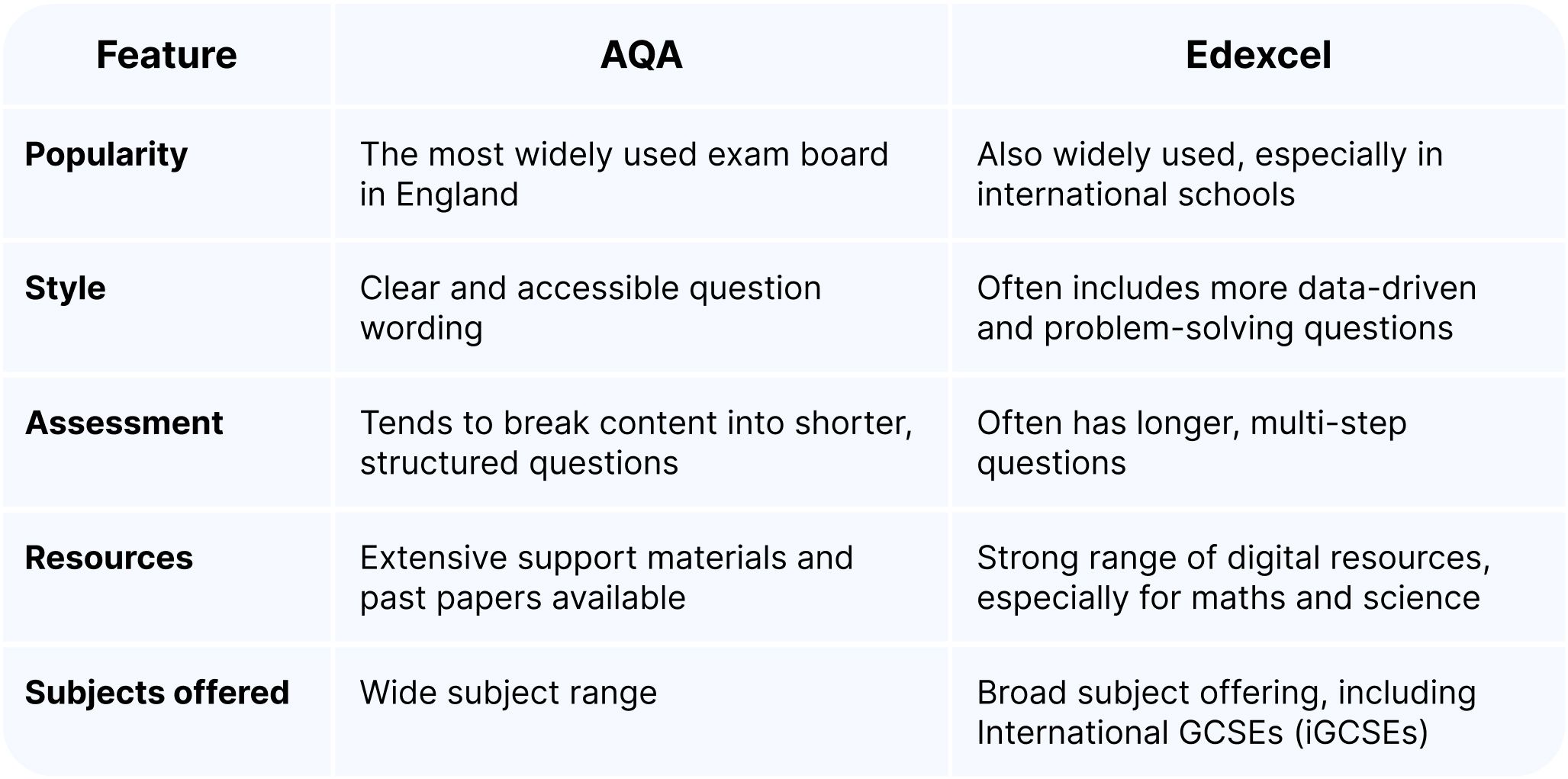Contents
Ever wondered why GCSE revision resources often specify “AQA” or “Edexcel”? For anyone preparing for GCSEs, understanding the difference between exam boards can make a big impact on how revision is planned.
In this guide, we’ll explain:
How AQA and Edexcel compare across core GCSE subjects
What this means for revision and exam preparation
How to build confidence, whatever board the school has chosen
Knowing how exam boards differ helps students revise smarter, practise the right question types, and enter the exam hall ready for success.
What is an exam board?
An exam board is an organisation that sets and marks GCSE exams. In England, the three main boards are AQA, Edexcel (also known as Pearson Edexcel), and OCR.
Schools choose which board to follow for each subject at the start of the Key Stage 4. While all boards follow the national curriculum and lead to the same GCSE qualifications, their assessment style, exam format, and mark schemes can vary.
Free revision timetable template & more
Less stress, more success! Get your free revision timetable templates and guide to effective revision today. Because great revision starts with a solid plan.
Key differences: AQA vs Edexcel
Here’s a breakdown of the main differences between AQA and Edexcel at GCSE level:

Subject-specific comparison:
Science
AQA:
Breaks the sciences into clear, separate sections: Biology, Chemistry, and Physics, making it easier for students to track their progress.
Required practicals are straightforward, and most questions are structured, guiding students step by step through their answers.
Edexcel:
Science leans more heavily into data analysis and real-life applications for science.
Expect more multi-step questions that test how well students can interpret information and link ideas across topics.
English Language
AQA:
Paper 1 explores a single fiction source in Section A. Students answer structured questions that build up to an extended analysis of language and structure.
In Section B, they’re asked to write creatively, often describing a scene or narrating a short story.
Paper 2 switches focus to non-fiction, using two linked sources to explore viewpoints and develop persuasive writing skills.
Edexcel:
The exam typically includes two reading sources from the start, which students must compare and analyse.
Section B leans more towards transactional writing, like speeches, letters or articles.
English Literature
AQA:
AQA English Literature exams are all closed-book, so students must memorise key quotes and themes.
The questions are essay-based and focus on character, theme, and how writers use language.
Edexcel
Edexcel papers offer more flexibility, with different routes allowing schools to choose texts that suit their students best.
Some specifications (like the Edexcel iGCSE) even allow open-book exams, which can reduce pressure on memorisation.
Maths
AQA:
Maths papers tend to be clearly structured, helping students know exactly where to show their working.
The mark schemes reward logical steps, making it ideal for students who prefer a methodical approach.
Edexcel:
Edexcel maths has a reputation for including more complex, real-world problem-solving.
Some students find the questions trickier, but it’s a great board for those who enjoy applying maths to unfamiliar situations.
Does the exam board matter?
Yes and no.
Yes, because each board has unique question styles, practical assessments, and mark schemes.
Preparing with the correct past papers and understanding the examiner’s expectations can make a big difference.
No, because they all lead to the same qualification. Universities and employers don’t prefer one over the other.
The most important thing is to revise with resources tailored to your exam board. This ensures you practise the right question formats and cover all required content.
How to find out your exam board
If you’re not sure which exam board you’re studying with, the easiest way is to ask subject teachers. Schools usually confirm exam boards at the start of the GCSE course so that lessons, homework, and mock exams follow the right specification.
You can also check:
Your school’s GCSE curriculum guide or options booklet
Past papers or mock papers you’ve been given, the exam board’s name is usually printed on the front
Your school’s online learning platform or subject pages, where specifications and revision materials may be uploaded
Summary: AQA vs Edexcel at a glance
Most students cannot control whether they choose between AQA and Edexcel, but understanding the differences can make all the difference to revision success. Focusing on the right specification, practising past papers, and getting familiar with the exam style can make GCSE preparation more targeted and effective.
Knowing the format, whether it’s AQA’s structured questions or Edexcel’s problem-solving approach, is the first step to exam confidence.
Don’t miss Atom’s GCSE giveaway!

Six months. Six epic prizes. Six chances to make the GCSE season unforgettable.
We’re launching Atom for GCSE prep in 2026, and to celebrate, over the next six months, we’re giving away thousands of pounds worth of prizes to help your child level up their GCSE revision.
Here’s a taste of what’s up for grabs:
The latest Apple tech, including an iPad Air, Vision Pro and more
Festival tickets for Boardmasters and Reading 2026
Europe interrail passes and £1,000 spending money
…and that’s just a few of the amazing prizes available.
Our first two winners have already taken home incredible prizes! Find out who they are and what they won in our latest giveaway update and keep an eye out for news of our November winner.
It’s free to join. UK only. Full T&Cs apply.
Contents
